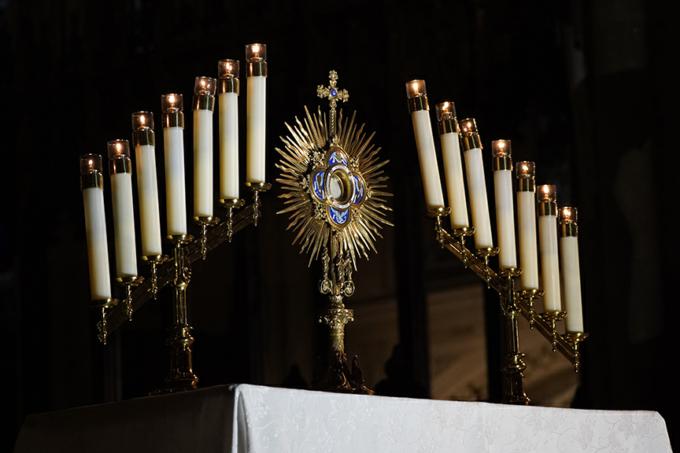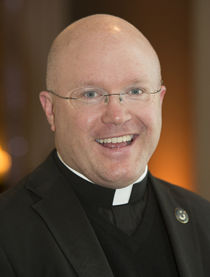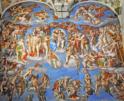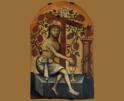
Faith
The Revival is needed, we could say, as a remedy for widespread ingratitude. There is certainly a crisis in Eucharistic knowledge and faith, shown in surveys that indicate that up to seven of 10 U.S. Catholics do not believe in the Real Presence of Christ in the Eucharist.

Landry
At every Mass, one of the most significant dialogues in human life occurs. The priest says, "Let us give thanks to the Lord our God," the faithful respond, "It is right and just," and the priest replies with a saying of great theological depth: "It is truly right and just, our duty and our salvation, always and everywhere to give you thanks, Lord, Holy Father, almighty and ever-living God."
It's fitting to give God thanks, "always and everywhere." It's appropriate for us to do so on sunny days or rainy ones, when we feel like a million bucks and or are in the hospital, when we're attending weddings of loved ones or their funerals, when we get promotions at work or pink slips, when we win or when we get routed.
It's right and just to thank God at all times and places because everything that happens -- both what the world considers adverse or propitious -- God either wills or allows, seeking to bring spiritual good out of each (Rom 8:28). Our salvation, we boldly proclaim, rests on our gratitude, which opens us up to receive God's grace. Thanking God in response to all God has done, therefore, is our sweet duty.
These are thoughts that should influence every November as we prepare for the national celebration of Thanksgiving. These are also thoughts that must characterize the Eucharistic Revival.
The Mass is a school of Thanksgiving, where we are trained to give thanks to God always and everywhere as the right thing to do, as a duty of justice, and as the path to salvation.
It's highly significant that when the first Christians described what they were doing as they convened to "do this in memory" of the Lord, they didn't call it the celebration of the Body and Blood of the Lord Jesus. They didn't name it the feast of the Lord's Supper, the Banquet of the Lamb, the sacred synaxis or several other alternatives that would have been theologically appropriate. They called it, rather, the Eucharist, from the Greek word, "Eucaristein," which means to give thanks.
Every time they came together for Mass, it was, in effect, Thanksgiving Day. It was Thanksgiving during the times of growth and peace. It was Thanksgiving during the times of persecution. Their fundamental approach to the Mass was that it was the greatest way possible for them to thank God for the gift of life, for so many blessings of family and friends, for the gift of the Christian faith and the new life received in baptism, for the gift of salvation, and even for the crosses God permitted.
They recognized that in Mass, they were entering into Jesus' own prayer of thanksgiving to the Father. Jesus' prayers were always marked by gratitude. He thanked the Father before the multiplication of the loaves and fish (Jn 6:11). He thanked him for revealing his wisdom to the merest of children instead of to the clever and proud of the world (Mt 11:25). He thanked him before the resuscitation of Lazarus (Jn 11:41). He thanked the Father even before he would give his own body and blood during the Last Supper and on Calvary (Mt 26:27).
In the Mass, we enter into Jesus' constant and ubiquitous thanksgiving to the Father. The Mass is our continuous thanksgiving from the rising of the sun to its setting. It is a prayer that helps us to become fully Christian, since to be Christian is to render constant thanks (1 Thess 5:18).
So, as we enter more deeply into the Eucharistic Revival in the Church in the United States, one of the outcomes must be greater gratitude for Jesus' self-gift in the Eucharist.
The Revival is needed, we could say, as a remedy for widespread ingratitude. There is certainly a crisis in Eucharistic knowledge and faith, shown in surveys that indicate that up to seven of 10 U.S. Catholics do not believe in the Real Presence of Christ in the Eucharist. But if those numbers are accurate, then we would expect at least the three of 10 Catholics who believe to come to be with Jesus on Sunday. Instead, surveys reveal only one of six attends. That means that at least 40 percent of those who believe in the Real Presence do not show up to be with him and be nourished by him at Sunday Mass. One of the reasons doubtless is because so many take his presence for granted.
That's why to live the Revival well, we must augment our Thanksgiving. Thanksgiving for the mind-blowing reality of the Mass and the awesome privilege of receiving Jesus in Holy Communion. Thanksgiving for the privilege to spend time adoring him in the Eucharist. Thanksgiving for the way the Eucharistic Jesus keeps his promise to remain with us always until the end of time.
Recently, I've been able to participate in two great manifestations of gratitude for Jesus in the Eucharist.
The first was the Napa Institute Principled Entrepreneurship Mass and Eucharistic Procession on Oct. 10 in midtown Manhattan. More than 4,000 people attended Mass in a packed St. Patrick's Cathedral before taking him out in procession to Broadway and back.
The second was the New York State Eucharistic Congress that took place for 40 hours at the Shrine of Our Lady of Martyrs in Auriesville, New York, where from Oct. 20-22, 8,500 people came from across the State to the site of the martyrdoms of Sts. Isaac Jogues, Rene Goupil, and Jean de Lalande and the birth of St. Kateri Tekakwitha. They were there for 12 keynotes, two inspiring Masses, and a Eucharistic Procession double the size of the one in Manhattan.
Among the keynoters was the incomparable Prof. Peter Kreeft who spoke on the Eucharist as the remedy and response to secularism. Secularism, as Pope Benedict XVI was accustomed to say, is living as if God does not exist. A Eucharistic life means to live with God-with-us in the perpetual incarnation of the Eucharist and to make the Eucharistic Jesus the source, summit, root, and center of our existence.
Kreeft's hymn of Thanksgiving -- a combination of childlike wonder and epochal scholarly logic -- was unforgettable.
"The Catholic claim about the Eucharist," he ebulliently stated, "is barely believable, incredibly incredible, stunningly stunning, astonishingly astonishing. Almighty God assumes human flesh and lets us eat his body and drink his blood!"
Contrasting secularist and Catholic views, he said, "This startling Catholic claim is either true or false. If it is false, if the Eucharist is not Christ Himself but only a holy symbol of Christ, ... then Catholics are the most shamefully sacrilegious and idiotic idolaters in history."
Just as Jesus of Nazareth was either who he said he was, a lunatic, or a liar, but couldn't be just a good moral teacher, so the Eucharist is either who Jesus said it is or the worst idolatry of all time.
"The Eucharist is either to be worshipped as God, as the extension of the Incarnation, or denounced as the most blasphemous and ridiculous idolatry in history," Kreeft emphasized. "The one thing it cannot possibly be is something comfortable, compromising, non-divine and therefore non-divisive, merely a holy symbol."
It's either ... or.
And if the Eucharist is who Jesus attests he is, then Mass attendance makes sense not just on Sundays but every day one can. Adoration becomes the most important conversation one can have. Taking him in celebratory procession is so much more important than participating in every ticker tape victory parade.
And rendering God the Father constant thanks for Jesus in the Eucharist becomes the most obviously right and just thing we can do, a sweet duty and, yes, our salvation, because it's there we meet, love and receive our Savior.
- Father Landry is a priest of the Diocese of Fall River who is national chaplain to Aid to the Church in Need USA, a Papal Missionary of Mercy and a Missionary of the Eucharist for the US Bishops.
Recent articles in the Faith & Family section
-
The kingdom of ChristJaymie Stuart Wolfe
-
Pilgrims of hope -- Holy Year of 2025Father Robert M. O’Grady
-
Honor Mothers at Home and In the MissionsMaureen Crowley Heil
-
On the vineScott Hahn
-
What is the church's position on the treatment of animals?Jenna Marie Cooper


















